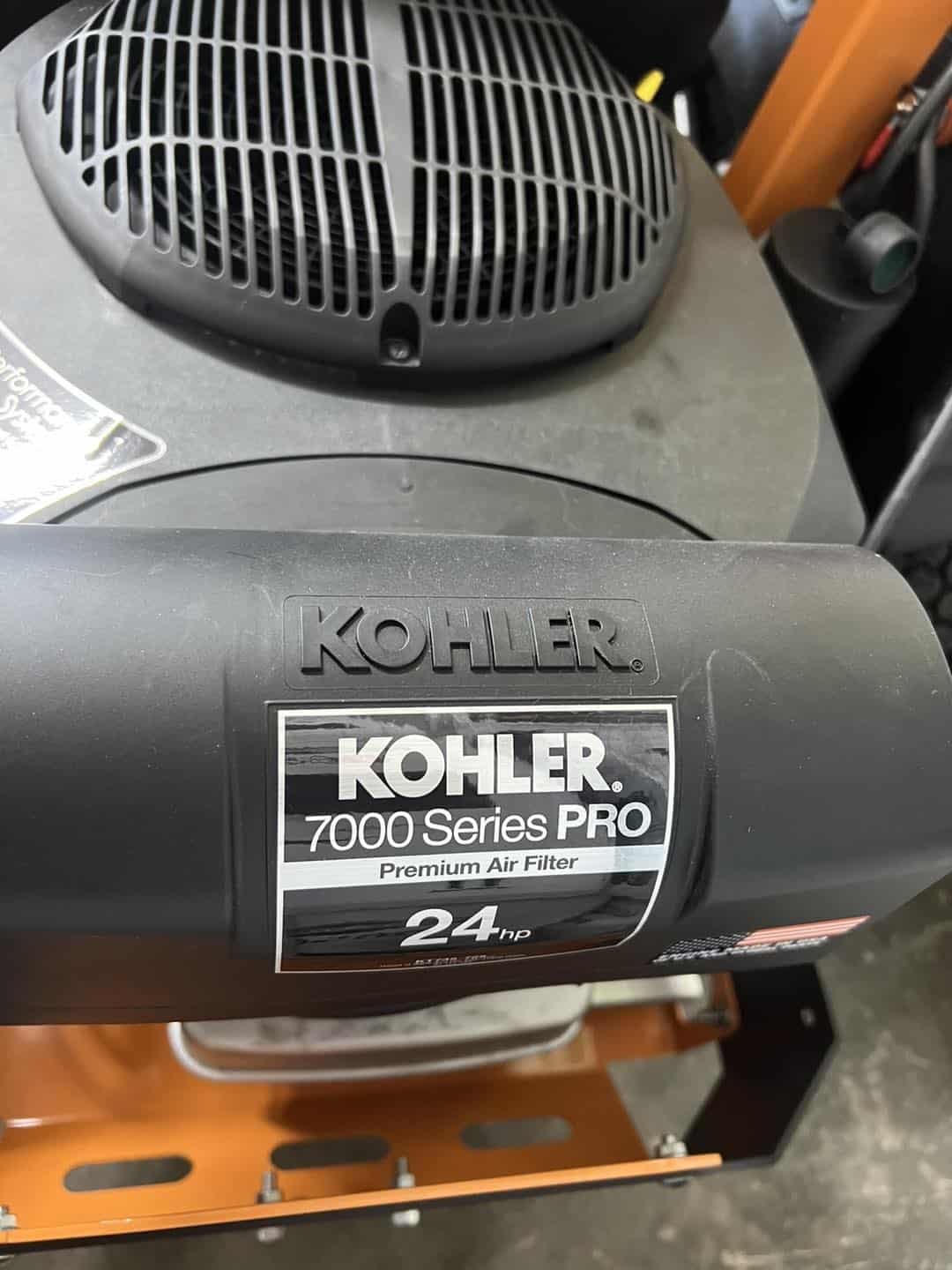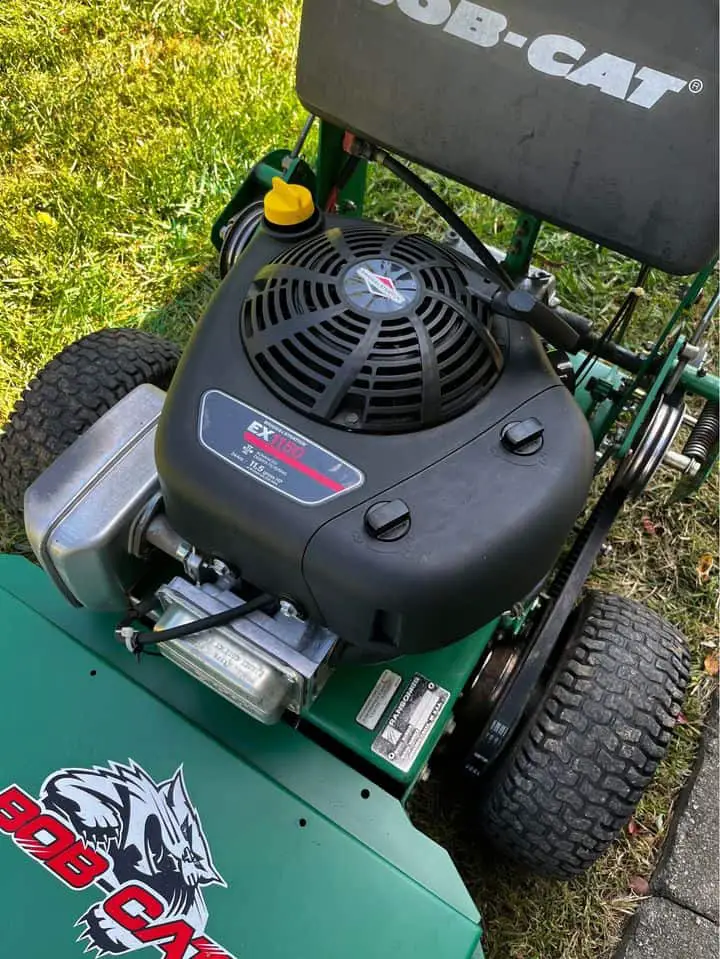Hi!
When looking for a reliable lawn mower, we will check its specifications, with CC and HP being the most important features to check. But what do they mean?
This article will help you compare and contrast a lawn mower CC vs. HP. Let’s see how you can use them to choose the best lawn mower!
Contents
What Is The Difference Between HP Vs. CC In A Lawn Mower?
Both HP and CC illustrate how powerful a lawn mower can be. However, while HP refers to the power output, CC represents the engine’s displacement.
What is HP?
HP, which stands for “horsepower,” refers to the power output of a lawn mower. Based on it, we can tell how powerful the machine works.
An engine with a higher horsepower rating will generally be more powerful. You can use it to handle heavier workloads and more difficult cutting tasks.
The horsepower ratings of lawn mowers can differ significantly depending on the manufacturer and model. For example, a push lawn mower often has a horsepower rating of 3 HP, while the figure of a big riding mower can be up to 20 HP. Hence, you can ride it for hours.
Another example is that most horizontal lawn mowers have a 3 to 7 HP rating. Yet, vertical engines are often more powerful, measuring about 10 to 30 HP.
Read more: [Top 5] Best Lawn Mowers For Women: Reviews, Specs, Prices

HP refers to the power output
What is CC?
CC (cubic centimeters) is the displacement or size of a lawn mower. We measure it based on the volume of the machine’s cylinder.
The displacement of a lawn mower is the total volume of fuel and air drawn into the engine’s cylinder during operation.
For example, if a lawn mower has a displacement of 150 CC, it means that it can draw up to 150 cubic centimeters of fuel and air to complete a full operation cycle.

CC refers to the displacement of the lawn mower
Comparing And Contrasting HP Vs. CC In A Lawn Mower
HP and CC are two different measurements, although they both aim to describe the power of your lawn mower. This comparison table is for comparing and contrasting them.
| HP | CC | |
| Measurement Unit | Horsepower | Cubic centimeter |
| Definition | The power output of a lawn mower | The displacement or size of a lawn mower |
| Calculation | Based on the engine’s torque | Based on the volume of the cylinder |
Read more: Great States 815-18 Review: A Reliable And Environmentally-Friendly Option
We measure the horsepower of a lawn mower using its RPM (revolutions per minutes) and the torque output. The formula is: HP = Torque x RPM/5,252.
In this formula, torque is the measure of the lawn mower’s rotational force, measured in foot pounds. RPM refers to how fast the engine can spin.
You would need to measure the torque and RPM of a lawn mower to calculate its horsepower output. Then, apply the formula above to get the result.
However, this method is not practical for users. The manufacturer already mentions this specification on the product. You can check your owner’s manual or the manufacturer’s website.
On the other hand, we calculate the engine’s displacement based on the volume of its cylinders. The formula is: π x (Radius)2 x Stroke x Number of cylinders.
Of course, you don’t have to calculate the engine’s displacement on your own because it’s available in the product’s package. Yet, it’s important to consider the formula as you can imagine how CC and HP are irrelevant to each other.
As you can see, the two formulas require different elements to give you the outcome. Hence, you can’t use CC and HP ratings interchangeably.

We use different formulas to calculate CC and HP ratings
Which Makes A Lawn Mower More Expensive, CC Or HP?
When searching for a lawn mower, people often focus more on the horsepower rating. Hence, models with more horsepower cost more.
In a lawn mower, horsepower accurately measures its power output and overall performance. Homeowners and landscapers, therefore, consider this rating a tool to determine if the mower can help achieve their goal.
However, the price varies depending on other factors, such as the brand, materials, features, and accessories. So while the HP rating can contribute to the right price, it’s not the only thing to check for while purchasing a lawn mower.
Which Type Of Engine Is The Best For You?
Every lawn mower engine has CC and HP ratings, so you can check before buying. While the HP is slightly more important, the CC rating plays a vital role, too.
But aside from these two factors, consider other factors, such as cutting height, cutting width, and maneuverability of the lawn mower.
Also, your lawn’s type, size, and terrain determine the power you need for your lawn mower. So, it’s difficult to decide on the best machine for lawn-care tasks. But when you find one, it must be satisfactory.

Check all the specifications while buying a lawn mower
Frequently Asked Questions
1. How powerful of a lawn mower do I need?
The power your lawn mower should have depends on the type and size of your lawn. For example:
- Lawn size: A horsepower rating of 5.5 to 7 HP is enough if you have a small lawn. But if it’s bigger, choose the mower with a higher rating.
- Lawn type: If your lawn has slopes or rugged terrain, your lawn mower should have a higher horsepower rating to handle the extra workload.
2. Does higher CC mean more power lawn mower?
A higher engine displacement often means it’s more powerful than the lawn mower with a lower rating. However, it’s not always the case.
For example, the design and overall build of the machine also affect the power. Some people even pay more attention to the horsepower rating.
However, the engine displacement (measured in CC) is also an important specification to check. If possible, go for the higher rating so your lawn mower can perform effectively.
Conclusion
The power of a lawn mower engine depends on both HP and CC, although we measure and use them in different ways.
When choosing a lawn mower, it’s critical to weigh both HP and CC ratings. Also, consider other factors to ensure the lawn mower you buy is strong enough to satisfy your demands.
Hopefully, this article has helped you learn more about lawn mower specifications. If you need any further information, reach out to us at any time. We are always ready to help.
Thank you for reading!





